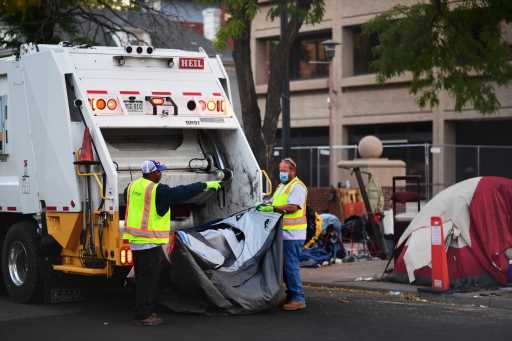Ruling that required Denver to give 7 days’ notice of homeless sweeps overturned
A federal judge’s ruling last year that Denver officials must give seven days’ notice before sweeping most illegal homeless encampments was invalid, the 10th U.S. Circuit Court of Appeals concluded this week in a split decision.
The judge’s order, which came as part of a lawsuit filed by the advocacy group Denver Homeless Out Loud against the city, should never have been issued because the group and other plaintiffs were barred from bringing particular constitutional claims due to a previous legal settlement with Denver, a panel of three judges found in a 2-1 ruling.
The appeals court ended the judge’s preliminary injunction, which required Denver to give seven days’ notice before sweeps and set in place other requirements, like alerting City Council members about plans to clear encampments.
In an unusual move, the appeals court judges considered the prior legal settlement’s impact on the current lawsuit — and hung their ruling on it — even though Denver’s attorneys did not raise the issue in their appeal.
The sole dissenting judge, Veronica Rossman, took issue with that approach.
“My colleagues take the extraordinary step of raising the affirmative defense of claim preclusion (on their own) on behalf of the Denver defendants to reverse the district court,” she wrote. “I see no basis for this unwarranted exercise of appellate discretion.”
While the ruling ends the preliminary injunction against the city, it does not end Denver Homeless Out Loud’s overarching lawsuit, which seeks damages for people experiencing homelessness whose possessions were seized or damaged in the city’s sweeps.
It also doesn’t give Denver free reign to sweep encampments without any advance notice, because the previous legal settlement between the city and Denver Homeless Out Loud requires the city to give that notice, said Andy McNulty, an attorney for the advocacy group.
He added that the current lawsuit was filed because Denver was not following the original settlement’s terms, though the city has given the required seven-day notice since the injunction was put in place.
“What spurred on this lawsuit was their blatant ignoring of the contractual terms of that,” McNulty said. “So if Denver wishes to abide by its word, it will not engage in sweeps without seven days’ notice, but I think it’s been proven that Denver’s word is not worth the paper it is written on.”
He called Tuesday’s ruling “unprecedented” and “wrongly decided,” saying it lets the city off on a “technicality.”
A spokeswoman for the city attorney’s office, Jacqlin Davis, said Denver is following the prior settlement’s terms and said city officials were “pleased” with Tuesday’s ruling.
“The city has and will continue to honor its commitments as set forth in the Lyall Settlement agreement we previously entered into with the class of people experiencing homelessness,” she said in an email.
Ana Cornelius, executive director for social change and advocacy at Denver Homeless Out Loud, said she hopes the city will continue to follow the practices set out solely in the injunction even though city officials are no longer legally required to do so, noting that the injunction’s terms were not significantly different from the original settlement, which the city is still required to follow.
The overarching lawsuit and the group’s broader push to end homelessness will continue, she said.
“For us,” she said, “it’s a fight that doesn’t end until everybody has housing.”
Source: Read Full Article



